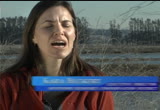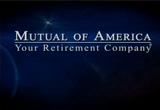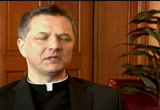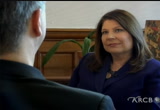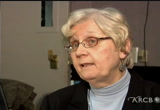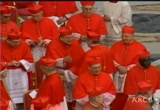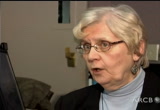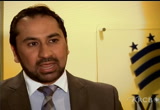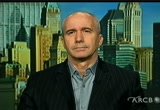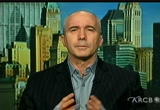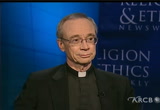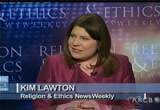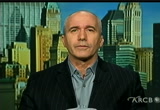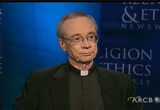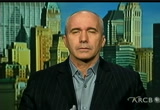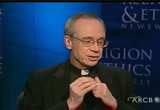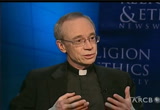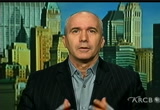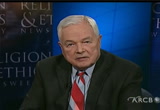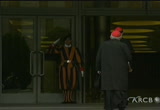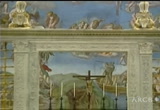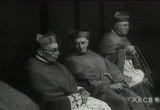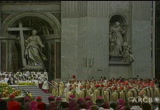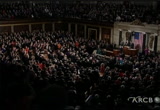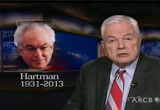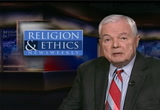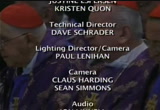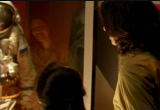tv Religion Ethics Newsweekly PBS February 17, 2013 10:00am-10:30am PST
10:02 am
coming up, the pope's stunning decision to resign, reaction to it and what the cardinals might be looking for when they gather next month to choose benedict's successor. >> announcer: major funding for religion and edge ikz news weekly is brute to you by a family foundation dedicated to its founders' interest in religion, community development and education. additional funding also provided by mutual of america, designing customized, individl and group retirement products. that's why we're retirement company.
10:03 am
and the corporation for public broadcasting. >> welcome. i'm bob abernethy. it's good to have you with us. pope benedict xvi stunned the world this week with the surprise announcement that he's decided to resign, the first pope to step down in 600 years. our coverage today includes analysis from two experts on the church, and it begins with reacti from catholics and non-catholics alie, gathered by our managing editor kim lawton. >> benedict said he's resigning "for the good of the church." >> isn't that a profound sign of his own humility in that he was able to recognize when, you know, it just was more than he could handle? and instead of letting just sort of others do the job, he viewed
10:04 am
very strongly that we needed somebody in that position that would really be able to take the helm. >> i think this decision was made out of love for the church and her needs. >> but it was an almost unprecedented decision. >> in my lifetime, popes have died in office. one has never resigned. and then i all of a sudden discovered that, well, no wonder, it's been almost 600 years since the last pope resigned in 1415. >> experts say benedict's decision highlights how the nature of the papacy has changed. >> it's become much more demanding. you're much more public. you're in print. c1 you're in print. you're on video. 60 years ago, pope pius xii would not have had the same demands on him in any way. >> maybe it's not so much that their job has changed, but the expectations have changed. the immediacy. there's so many things that we as a society have developed into this instantaneous culture and that no longer are we waiting for a letter to arrive from
10:05 am
rome. when we get an instantaneous mass delivered message, i mean, that's a whole shift. >> as the news of benedict's impending departure took hold, people inside and outside of the church began offering assessments of his legacy. >> i think that pope benedict brought a refreshing and wonderful attention to theology. >> pope benedict has been, has had great clarity in his teaching on issues with respect to the sanctity of life, with respect to marriage, with respect to religious liberty. >> he certainly was in tune with modern technology, even joining twitter just a few weeks ago, and he was an environmental pope. he was often dubbed the green pope, and he took climate change seriously and he talked about that. so i think those are positive things. >> but sister maureen fiedler, host of the public radio program "interfaith voices," says benedict's papacy will be largely viewed by how he dealt
10:06 am
with the clergy sex abuse crisis. >> i think probably the biggest disappointment with benedict was his inability to adequately handle the sex abuse scandal and to specifically deawitthe prelates, the bishops who covered up those crimes. a lot was done with priests. almost nothing has been done with bishops. and i think that remains a scandal for a lot of catholics. >> other catholics praise his efforts on that front. >> he took that scandal head on and implemented all kinds of new protocols to address that issue once and for all. so i see great hope on that issue going forward. >> speculation about benedict's possible successor continues as people put forward the qualifications the college of cardinals should consider. >> certainly they'll want somebody who is a good communicator and particularly has linguistic competence.
10:07 am
you'll need to know italian. that's the daily language of the vatican. english and spanish would be extremely helpful. >> i think of center. center importance is a deeply spiritual and prayerful person. this is why people look to the church for their spiritual nourishment. so that's central. but the pope has to be a man of the world in a certain sense. he has to have a knowledge of different cultures. we keep raising the bar in so many ways. >> i personally would like to see a pope who would take seriously the message of the second vatican council, develop greater collegiality in the church, perhaps even democratization in the church. a pope who respects the human equality of all persons, man and women, and begins to make suitable changes in the church in that direction. >> but father morozowich says
10:08 am
whoever is chosen is not likely to make sweeping changes. >> so a new pope will bring new vigor, will bring his personality, his personal gifts. he will continue, though, the tradition of the church. >> people of other faiths say the selection of a new pope matters to them too. >> the quality of catholic-jewish relations has been a kind of litmus test for us in terms of the openness of peoples of different religions to the jewish community and to cooperative understanding and endeavor, and therefore it feels of vital concern to us. >> what he says matters in a lot of communities and so the stature of the pope is extremely important in that sense, but also the fact that we live in a very small world when it comes to interaction. >> the heart and soul of humanity is lived out among people of faith in every tradition, and so i will be joining the world in praying for the next pope.
10:09 am
>> and for the world's more than one billion catholics, the selection will have a personal dimensn asell. >> what makes the pope the pope is that he is held by catholics to be the successor of st. peter. and, in that sense, he carries on peter's role of uniting the church, of being the point of unity for all the world's bishops and all the world's catholics in some sense as he belongs to everybody in the church. >> as catholics, of course, we have great affection for our holy father. we look to him as a father. and it'll be exciting to meet our new pope. >> kim and i are joined now by father tom reese of the woodstock theological center at georgetown university and david gibson of religion news service, author of "the rule of benedict: pope benedict xvi and his battle with the modern world." david is in new york. welcome to you both.
10:10 am
david, let me begin with you. what do you think the cardinals will be looking for most eagerly when they meet to choose a successor? >> well, bob, i think they're going to take for granted that whoever they choose is going to be an orthodox cardinal and follower of pretty much the line of benedict xvi and the previous popes in terms of doctrine and all the hot button issues that we often like to talk about. i think they're also looking at someone who might be a bit younger. some of the cardinals have said they don't want to elect anyone who's over 70. benedict xvi was 78 when he was elected eight years ago. but i think the big choice really facing them is whether they are going to go outside of europe really for the first time in the modern era, the first time almost ever, and pick someone from the southern hemisphere, from latin america, asia or africa, really where the catholic church is booming,
10:11 am
which is the real future of the church there, and are they going to pick a pope who reflects that growth. >> tom? >> well, i think the cardinals are going to be looking for three things. one, somebody who they think will make a good pope, which means somebody who agrees with them on their values and what they think of the vision of the church. the second is someone that they can have a personal relationship with. i mean they'd really like to have a friend in the pope. and third, i think they want someone who will be accepted and liked in their own country. i mean, you think, for example, of the cardinals that live in countries with lots of muslims. you don't want the pope saying something that upsets muslims because that would not be good for the people in their country. >> and whoever it is, tom, is there any possibility, at all, that some of the things that
10:12 am
americans, especially american liberals, want most, which are things like permission for there to be married priests? >> uh, no. >> no possibility at all? >> i don't think so. you have to remember that more than half of the cardinals who are going to choose the next pope were appointed by benedict, and the rest of them re all appointed by john paul ii. and they did what you or i would do if we were pope. they appointed people who basically agree with them on the issues facing the church. so anyone who was in favor of women's ordination or changing birth control or married priests would never have made it into the college of cardinals. >> one of the things i've found really interesting as i was talking with people this week was how the questions of who we are going to pick also lead to questions about the nature of the papacy. and it's just become so big.
10:13 am
the pope has to be a diplomat. he has to be a spiritual leader. he has to know how to tweet. can you find one person that can do all of that? and, david, is the situation today also affecting how we look at the papacy? >> i think, very much. you have to understand, i think this resignation by benedict xvi really is a groundbreaking move in the history of the papacy, in the modern history of the papacy. it hasn't happened in 600 years. but it really goes to demystify the pope in many ways and restore the idea that this is about the office, the successor of saint peter, not just this cult about a certain person, who has kind of been elevated to almost a demigod in the eyes of so many. so it really refocuses the church's attention on what the job of the pope is. and as you say, it's a really big job. it's a 24/7 job now in a way that it never was before. i think the question is, can you find a pope who knows how to delegate, who knows how to pick
10:14 am
really able administrators who can do a lot of these things for him and a pope who knows how to consult in a way that benedict did not perhaps? >> i think kim and david have made excellent points. and in the last two conclaves what they've done is they've elected the smartest man in the room. and the question today is, should they do that again? or should they elect someone who will listen to all the other smart people in the church? should they look for someone for example who has more diplomatic experience? they've tended to stress the role of the pope as teacher as opposed to the role of the pope as someone who brings people together, who develops and works to create consensus, who's really strongly pushing dialogue. >> the pope needs to have a pretty keen sense of public
10:15 am
relations, too, and there's some evidence that's been missing lately. is that high on the list? >> i think it needs to be. i mean, the papacy, whether you like it or not, you're under constant view by the whole world. you're on a world stage 24/7. and if you say things that don't make sense to people or that come across badly to people, it causes great problems for the church. >> david, there's kind of a buzz word around called "new evangelization." i gather than means evangelizing and going in, preaching the gospel more vigorously perhaps. what does that imply? and what does that imply particularly for the united states? >> well, the church, the vatican and the cardinals and bishops in the united states, know that the catholic church in the modern world has to do a better job at preaching and evangelizing. it's a marketplace out there in a way that it never was before.
10:16 am
you know, people can be born catholic and raised catholic, but that's not exactly the choice they're going to make as adul1 catholic and raised catholic, but that's not exactly the choice they're going to make as adults. so they have to be out there competing. but again, it's that word, preaching. is it just about words? as tom said, they elected the smartest man in the room the last two times out. is it just about the words you use? or is preaching and evangelizing also about actions? do you they need really a pastor, someone who can communicate through actions and gestures as much as through words? >> i think pope benedict expressed it very well. he said that christianity should not be presented as a series of noes but as a yes, a yes to love, a yes to life, a yes to justice and peace. you know, the principal job of the pope and of the whole church is to figure out how to preach the gospel in a way that is understandable and attractive to people in the 21st century,
10:17 am
especially to young people who are just turned off by religion. >> does that imply a kind of, what we think of as evangelical protestantism, very vigorous, loud music, plenty of excitement? can we look for that in south america, at least, from the church? >> we're seeing it in south america. we're seeing it in africa with music and dance. we have to adapt christianity. well, better put, we have to express christianity in different cultures in different ways. remember st. augustine and st. thomas aquinas. what they did in their time was take the best intellectual thought. for augustine, it was neoplatonism. for aquinas, it was aristotle. and press christianity to their generations using those philosophers. thomas aquinas' books were burnt
10:18 am
by the bishop of paris. we shouldn't just quote augustine and aquinas. we should imitate them and figure out how to express christianity in the best way that we can in this century. >> i have a question that i wanted to get in. also, just this very curious situation that we're finding ourselves in, we will find ourselves in, where we're going to have two popes or the pope emeritus and the new pope, that could create some tensions that could in some ways undermine the new pope if the other pope is still around. i mean, benedict says he's going to be hidden from public life. but, david, how do you see that working out? what pitfalls do you see? >> i see it as becoming a real problem down the road. initially, look, this was such a surprise to everyone. it shouldn't have been a shock, really.
10:19 am
benedict sent a lot of signals that this was going to happen. if anyone could do it, it was this kind of very orthodox pope resigning, this kind of nixon to china move almost. and it was natural that there was no real plan for what you would do with a pope emeritus. so, for security reasons, and a lot of other reasons, i think it made sense that he should live inside the vatican, at least at first. but i think it is going to become a problem down the road, especially if he continues to write and to publish some of his writings. >> david, one of those that's mentioned from time to time as a possible pope is the archbishop of new york, timothy dolan. is there anything to that, do you think? >> i think it's a great story. don't think it's going to happen. >> okay. our thanks to father tom reese of the woodstock theological center at georgetown university and to david gibson of religion news service. we want to revisit now a story we ran some years ago on the process the cardinals follow when they choose a new pope. you will notice some familiar faces that look a little younger but were just as knowledgeable and helpful then
10:20 am
as they are today. again, kim lawton. ♪ >> in the gospel of matthew, jesus says his disciple per is the rock upon which the church will be built. he tells peter, "i will give you the keys to the kingdom of heaven." the roman catholic church teaches that its leader, the pope, is part of an unbroken succession from peter. selecting peter's successor is a momentous occasion. >> what you have in a conclave is you have a moment of change on a world scale that the change in no other office, the change of no other leader, comes close to replicating. the transition in american presidents does not have the gravity and does not have the global significance that a change in the papacy does. >> the details of the process have evolved greatly over the centuries. under current rules, after the death or resignation of a pope, cardinals under the age of 80
10:21 am
have between 15 and 20 days to gather in rome for the conclave. until a new pope is elected, the college of cardinals governs the church but with limited powers. >> when the cardinals meet to elect a pope, first of all, they're locked up so that they cannot be influenced by anything from the outside, and also so they can maintain secrecy. there will be no cell phones, no radios, no newspapers, no telephones, no communication with the outside world. >> every day the cardinals one of the first orders of business is swearing an oath of absolute secrecy. under modern church rules, the conclave area is swept for bugs and other surveillance devices. >> the cardinals are not supposed to be casting votes based on their image or based on political considerations but based on who they really think is best for the church. and the notion is that doing
10:22 am
that behind closed doors makes that somehow easier, makes that more possible. >> sequestered inside the sistine chapel, the cardinals vote by paper ballot, guided, the church says, by the holy spirit. >> they have a small piece of paper, and on it they write the name of the person that they are voting for. then they fold that piece of paper in two and hold it in their hand and march up one by one, holding it in the air so that everyone can see that there's only one ballot here. >> selected "cardinal-scrutineers" count the number of ballots, making sure they correspond with the number of cardinals in the room. they then tally the ballots aloud. the pope is chosen by a two-thirds vote. there can be four votes a day. after three days, the voting can be suspended for a day of further prayer and discussion. technically, any baptized male can be elected pope, although since the 14th century he has
10:23 am
come from the college of cardinals. after each round of voting, the ballots are burned in a special stove that has been used since the beginning of the 20th century. >> if the ballot had not elected a pope, they would put chemicals in to make the smoke black. if a pope is elected, they put certain chemicals into the stove with the ballots, so that the smoke comes out white. >> outside, people gather in st. peter's square to pray and to await the word from the conclave. modern popes have made their own changes that could have a huge impact on the future. in 1975, paul vi instituted the age limit of 80 and expanded the number of voting cardinals. john paul ii and benedict xvi further expanded and internationalized the college of cardinals. another factor for the conclave is the proliferation of the media, which challenges the vow of secrecy and perhaps also shapes the choices.
10:24 am
inevitably, observers are making up their short lists of candidates, lists that have already been revised many times. and beyond the politics and the process and the pageantry, for the world's catholics, the conclave is ultimately a holy endeavor. i'm kim lawton, reporting. >> pope benedict's resignation is to take effect on february 28th. the college of cardinals is expected to convene in march, which means that a new pope will almost certainly have been chosen by easter. in other news, in his state of the union speech this week, president obama addressed several issues of concern to many faith groups. the president pushed for stricter gun control, comprehensive immigration re and protections for senior
10:25 am
and protections for senior citizens, the middle class and working families. some religious organizations praised obama's demand to raise the minimum wage and his goal of eradicating world poverty. tibetan rights groups say since 2009 at least 100 tibetans inside china have set themselves on fire to protest chinese rule. the majority have been monks and nuns. also this week, in nepal, a former monk died after he set himself on fire in front of a buddhist shrine. china blames the dalai lama for encouraging the self-immolations. the dalai lama has said he can neither support nor condemn the protests. the prominent american-born jewish philosopher rabbi david hartman has passed away. he was 81. a leader of liberal orthodoxy, hartman founded the shalom hartman institute in jerusalem where he encouraged the study of many schools of jewish thought. in a 1999 interview on this program, hartman said he
10:26 am
believed that "the fundamental mission of the jewish people is to be a vision of pluralism and inclusiveness." and, finally, western christians this week marked the beginning of lent with ash wednesday, when many receive an ash mark of pence on their foreheads. in recent years, some congregations have made it easier for those who can't get to church to receive the ashes. at a washington, d.c. metro stop, the area's episcopal bishop mariann edgar budde and clergy from a nearby parish offered the imposition of ashes to busy commuters and passersby. they called the effort ashes to go. that's our program for now. i'm bob abernethy. you can follow us on twitter and facebook and watch us anytime on the pbs app for iphones and ipads. there's much more on our website. you can comment on all of our stories and share them. audio and video podcasts are
10:27 am
10:28 am
♪ . >> announcer: major funding is provided by the lily endowment, an indianapolis-based private family foundation dedicated to its founders' interest in religion, community development and education. additional funding also provided by mutual of america, designing customized individual and group retirement products. that's why we're your retirement company. and the
251 Views
IN COLLECTIONS
KRCB (PBS) Television Archive
Television Archive  Television Archive News Search Service
Television Archive News Search Service 
Uploaded by TV Archive on

 Live Music Archive
Live Music Archive Librivox Free Audio
Librivox Free Audio Metropolitan Museum
Metropolitan Museum Cleveland Museum of Art
Cleveland Museum of Art Internet Arcade
Internet Arcade Console Living Room
Console Living Room Books to Borrow
Books to Borrow Open Library
Open Library TV News
TV News Understanding 9/11
Understanding 9/11
